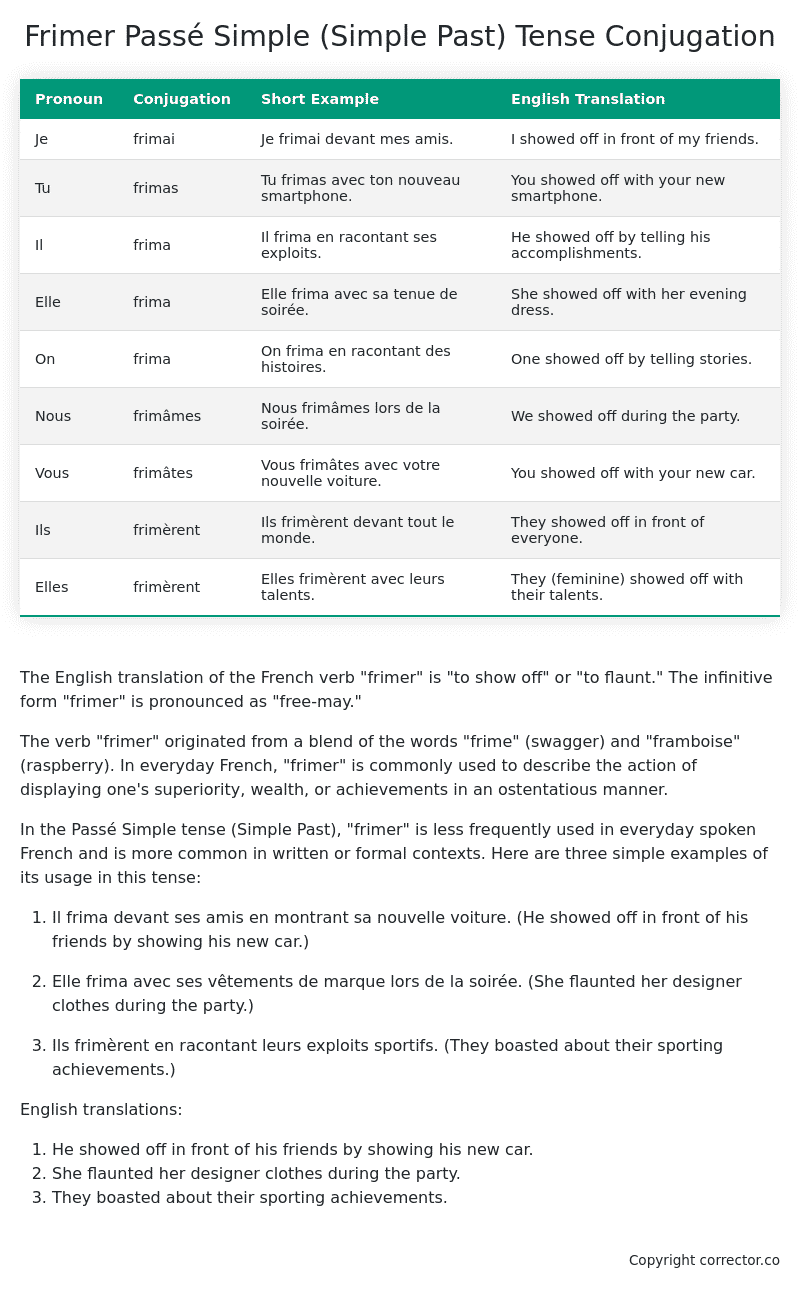Passé Simple (Simple Past) Tense Conjugation of the French Verb frimer
Introduction to the verb frimer
The English translation of the French verb “frimer” is “to show off” or “to flaunt.” The infinitive form “frimer” is pronounced as “free-may.”
The verb “frimer” originated from a blend of the words “frime” (swagger) and “framboise” (raspberry). In everyday French, “frimer” is commonly used to describe the action of displaying one’s superiority, wealth, or achievements in an ostentatious manner.
In the Passé Simple tense (Simple Past), “frimer” is less frequently used in everyday spoken French and is more common in written or formal contexts. Here are three simple examples of its usage in this tense:
-
Il frima devant ses amis en montrant sa nouvelle voiture.
(He showed off in front of his friends by showing his new car.) -
Elle frima avec ses vêtements de marque lors de la soirée.
(She flaunted her designer clothes during the party.) -
Ils frimèrent en racontant leurs exploits sportifs.
(They boasted about their sporting achievements.)
English translations:
- He showed off in front of his friends by showing his new car.
- She flaunted her designer clothes during the party.
- They boasted about their sporting achievements.
Table of the Passé Simple (Simple Past) Tense Conjugation of frimer
| Pronoun | Conjugation | Short Example | English Translation |
|---|---|---|---|
| Je | frimai | Je frimai devant mes amis. | I showed off in front of my friends. |
| Tu | frimas | Tu frimas avec ton nouveau smartphone. | You showed off with your new smartphone. |
| Il | frima | Il frima en racontant ses exploits. | He showed off by telling his accomplishments. |
| Elle | frima | Elle frima avec sa tenue de soirée. | She showed off with her evening dress. |
| On | frima | On frima en racontant des histoires. | One showed off by telling stories. |
| Nous | frimâmes | Nous frimâmes lors de la soirée. | We showed off during the party. |
| Vous | frimâtes | Vous frimâtes avec votre nouvelle voiture. | You showed off with your new car. |
| Ils | frimèrent | Ils frimèrent devant tout le monde. | They showed off in front of everyone. |
| Elles | frimèrent | Elles frimèrent avec leurs talents. | They (feminine) showed off with their talents. |
Other Conjugations for Frimer.
Le Present (Present Tense) Conjugation of the French Verb frimer
Imparfait (Imperfect) Tense Conjugation of the French Verb frimer
Passé Simple (Simple Past) Tense Conjugation of the French Verb frimer (You’re reading it right now!)
Passé Composé (Present Perfect) Tense Conjugation of the French Verb frimer
Futur Simple (Simple Future) Tense Conjugation of the French Verb frimer
Futur Proche (Near Future) Tense Conjugation of the French Verb frimer
Plus-que-parfait (Pluperfect) Tense Conjugation of the French Verb frimer
Passé Antérieur (Past Anterior) Tense Conjugation of the French Verb frimer
Futur Antérieur (Future Anterior) Tense Conjugation of the French Verb frimer
Subjonctif Présent (Subjunctive Present) Tense Conjugation of the French Verb frimer
Subjonctif Passé (Subjunctive Past) Tense Conjugation of the French Verb frimer
Subjonctif Imparfait (Subjunctive Imperfect) Tense Conjugation of the French Verb frimer
Subjonctif Plus-que-parfait (Subjunctive Pluperfect) Tense Conjugation of the French Verb frimer
Conditionnel Présent (Conditional Present) Tense Conjugation of the French Verb frimer
Conditionnel Passé (Conditional Past) Tense Conjugation of the French Verb frimer
Conditionnel Passé II (Conditional Past II) Tense Conjugation of the French Verb frimer
L’impératif Présent (Imperative Present) Tense Conjugation of the French Verb frimer
L’impératif Passé (Imperative Past) Tense Conjugation of the French Verb frimer
L’infinitif Présent (Infinitive Present) Tense Conjugation of the French Verb frimer
L’infinitif Passé (Infinitive Past) Tense Conjugation of the French Verb frimer
Le Participe Présent (Present Participle) Tense Conjugation of the French Verb frimer
Le Participe Passé (Past Participle) Tense Conjugation of the French Verb frimer
Struggling with French verbs or the language in general? Why not use our free French Grammar Checker – no registration required!
Get a FREE Download Study Sheet of this Conjugation 🔥
Simply right click the image below, click “save image” and get your free reference for the frimer Passé Simple tense conjugation!

Frimer – About the French Passé Simple (Simple Past) Tense
Formation
Usage
Narration
Historical Context
Interactions with other tenses
Passé Composé
Imparfait
Conditional and Subjunctive
Summary
I hope you enjoyed this article on the verb frimer. Still in a learning mood? Check out another TOTALLY random French verb conjugation!


